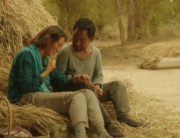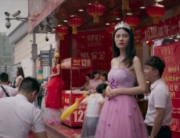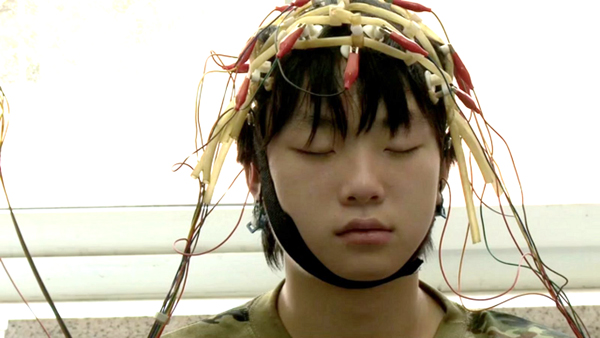What is the difference between memories and dreams? At one point during this beguiling Chinese neo-noir, a detective named Luo Hongwu (Jue Huang) claims that the former are always true while the latter aren’t. But what if he has it backwards? What drives him for much of the film are remembrances of an ex-lover, who disappeared years ago for reasons never explained. Luo hits the road to find her, but as it turns out, his true salvation possibly lies in a dream.
The film initially plays like a jumble of memories seeped in longing for what was. At first, Luo tries to solve two great mysteries: the significance of the green-covered book that was given to him by someone long ago—with all signs pointing to his mother as that person—and what happened to Wan Qiwen (Wei Tang), whom he met while trying to avenge the murder of his best friend. When we first see Luo and Wan together, there are definitely sparks between them, but as the narrative jumps backwards and forwards in time, the exact nature of their relationship becomes murkier.
For one thing, we learn that Wan was the girlfriend of the man who killed Luo’s friend, and when they first met, Luo roughed her up in order to find out the killer’s whereabouts. That definitely calls her motivations for entering a romance with Luo into question. It’s also interesting that while a sense of loss hangs over the film, Luo initially seems more focused on the green-covered book and only turns his attention to finding Wan after reaching a dead end. Perhaps the act of searching is more important for Luo than what he finds.
Director Gan Bi has an aesthetic that is heavy on symbolism—it’s probably no coincidence that most of the time we see Wan, she is dressed in the same shade of green as Luo’s book. He also has a knack for moody and evocative imagery, having his main protagonist sift through the remnants of his childhood home as rain pours in through the roof. His camera also tends to have a life of its own, often drifting across landscapes as if in search of something, seemingly reflecting Luo’s own state of mind.
There’s a slow burn as the narrative gradually makes its way toward an inevitable confrontation between the detective and the aforementioned gangster, Zuo (Yongzhong Chen), a man dapperly dressed all in white. But that is just the first half, which becomes something very different from the equally mysterious second half, after Luo takes a seat in a movie theater. He awakens in another dark and windowless space, where he meets a young boy who offers to show him the way out after a game of ping-pong.
This is just the start of a lengthy journey. Set in a labyrinthian city over the course of a single night, Luo wanders, eventually meeting Kaizhen, a woman who looks like Wan (and who is also played by Wei Tang). Other characters from the first half make appearances, although, like Wan’s doppelganger, none of them recognize Luo.
It is impossible to overstate how technically dazzling the second half is. It appears to consist of a single, unbroken shot in which the characters move through the constantly unfolding space and even go sailing through the air. Compared to the first half, which has far less slack in its pacing, there is a feeling of liberation here. This section is also entirely in 3-D, which lends itself to some spectacular images but also constantly reminds us that this is supposedly a movie—or perhaps a dream about a movie?
At one point, a character states that movies are like memories, and vice versa, but just as the first half seems to refute the idea that one’s memories could be a reliable indicator of the truth, the second half doesn’t appear to be Luo’s genuine memories; more likely, he is dreaming. But in that case, the film further debunks the idea that dreams are less truthful than our memories. Over the course of his travels, Luo arguably learns more about the complexities of love and romantic entanglements than he did during the entirety of his waking life. Perhaps what the filmmakers are trying to get across is that our dreams, which are controlled by our subconscious, have the potential to reveal universal truths that our conscious minds ignore.
The actors all do fine work, but the real star is definitely Gan, whose aesthetic resembles David Lynch’s in its blurring of fantasy and reality, as well as his knack for crafting scenes that are powerful and disturbing in the moment. One of the most memorable is the introduction to Zuo in the midst of torturing someone while performing karaoke with his henchmen. Despite it being a relatively small role, Zuo leaves an indelible impression from this one unsettling sequence, in which the camera uneasily follows him around as he vamps. The way in which Gan builds dread slowly is reminiscent of the classic scene in Blue Velvet featuring Dennis Hopper and Dean Stockwell singing Roy Orbison’s “In Dreams.”
By the finale, we cannot be completely sure where reality ends and the imaginary constructs begin—not that the filmmakers need to care about our confusion. Long Day’s Journey into Night may not tell the most coherent narrative, but it displays mastery of the medium. Even if the film is a bit of a head-scratcher, it’s a fun one to watch and try and figure out.

















Leave A Comment